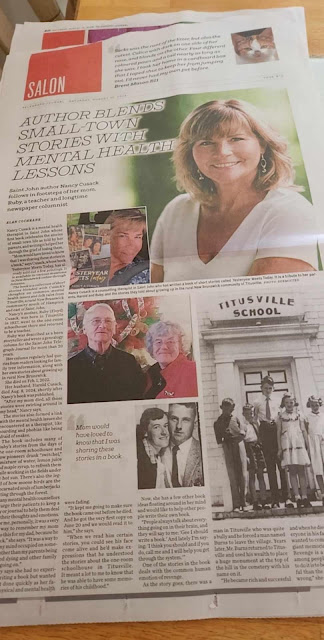Michelle is back and we couldn’t be
happier.
She is sharing the SBTS of her new poetry
collection, a touching personal journey.
She has been a welcome guest before
and if you missed it, please go HERE.
Read on my friends.
Michelle McLean is a poet, clinical social worker and addictions counsellor, animal and nature lover, and collector of treasure in all forms. Her poetry has found homes in Quills, elm & ampersand, Ascent Aspirations, Other Voices, Peacock Journal, Understorey, and others. Her collection of children’s poetry, When Pigs Fly and Other Poems, was published in 2020 by Chapel Street Editions. Her eldest daughter, Sophie Arseneau, is the illustrator and her youngest daughter, Lily Arseneau, is a contributing illustrator. Michelle and her family live in the small village of Bath, New Brunswick.
Title: Tesserae
Synopsis:
Tesserae is a poetry collection that traces the journey of trauma, grief,
addiction and recovery. It explores both
what is shattered, and the various ways we seek to rebuild. The term “tesserae” refers to small
pieces of stone, glass, tile or any other material used in the creation of a
mosaic. The mosaic is our lives, which can be
so messy, painful and sharp, but somehow still beautiful. That’s what I’ve learned and continue to
learn. We can sometimes find ourselves
utterly broken by the things that happen to us.
We also have the power, artistry and resilience to rebuild and make
something new.
The Story Behind the Story:
Ernest Hemingway once said, “write hard and clear about what
hurts”. I believe that’s what I did in
this book. I wrote these poems for
myself, for my own healing. From the
time I was a young child, I felt compelled to write about my experiences in
order to better understand them and poetry has always provided a safe space for
me to maneuver large, loud and often complicated, messy feelings in a way that
simultaneously provided a sense of freedom and containment. While intensely personal material, I opted to
pursue publication because…well, there’s just something special about seeing my
words in print and holding a published volume in my hands, something I
created.
This collection is heavy content.
I’ve described it as “equal parts scream and lullaby”. I was twelve years old when my sister Tracey was
killed in a horrific accident. She was
fifteen. This utterly shattered our
family. The loss of a child is the worst
loss imaginable. It’s unfathomable
(thankfully) to many of us. Where is
there space for the grief of sibling loss within this magnitude of
tragedy? I certainly didn’t know as a
child and didn’t even know where to begin to look or even how to ask. I didn’t even know the question. I was adrift in a sea of suffering that I
couldn’t identify, describe, or even begin to navigate. I was drowning. To borrow a line from the band Larkin Poe, “the
river runs deep and the deep stays down”.
My deep stayed down. Until it
didn’t. It was decades later when my
first therapist named “trauma” as a significant factor in my recovery. I remember being strangely defensive and
hostile with her about that. My parents
had trauma. Not me. I couldn’t (at that point) acknowledge the
magnitude of impact that my sister’s death had in my own life and
development. In my mind, my parents’
suffering was the only pain that mattered.
I couldn’t seem to make space for my own. I didn’t know how. For many years, poetry was the only space
where I let some of these feelings roam and find healthy expression.
My sister was a truly exceptional person and the impact of her loss is
now woven into the very fabric of who we are.
I don’t believe you “get over” grief, but it is possible to move forward
with it and learn how to carry it differently over time. These poems were written over the course of
many years. I’m very happy to say I’m no
longer in that dark place. The
collection itself is organized into three sections but certainly not meant to
imply any kind of neat and tidy “completion” – I’m a work in progress, just
like everyone else.

So those are my personal reasons for writing and publishing this
book. That said, it is also my sincere
hope that sharing these poems will play some small part in breaking down the
stigma that folks with addictions and mental health issues continue to
face. I think we’ve come a long way when
it comes to stigma, but we have a long way to go – particularly for those
suffering from substance use disorder. Stigma
kills. There’s simply no other way to
say it. Stigma is one of the biggest
barriers to treatment and recovery for substance use disorders according to the
Canadian Centre on Substance Use and Addiction (and my own anecdotal
experience, both personally and professionally). We need to fight stigma. It’s a matter of life and death for too many
people.
Early intervention is key. I
believe it’s critically important to model this for our youth. For everyone. I’ve often wondered how much suffering could
have been mitigated for me had I received mental health care as a youth who
felt so lost and alone in what I was going through. Unfortunately, that was not the culture of the
time – in my family, community, or in society more generally. The layers of unhelpful coping and defenses I
developed over the years as a result of muddling through on my own made it that
much more difficult than it needed to be to fully engage in healing. That said, I can’t emphasize enough that it’s
never too late.
Gabor Mate talks about trauma as the gateway to addiction. I think that is the case for many. He encourages bringing an attitude of
“compassionate curiosity” to our experiences.
I love that. I think that if we,
as a society, bring more of this “compassionate curiosity” to complex struggles
and problems that people face, we would have more helpful outcomes. Addiction is a problem – we all clearly know
this. What many don’t appreciate or
understand is that substance use issues and behavioral addictions were also
attempts at “solutions” for many of us when healthy solutions were scarce or
absent altogether.
We need to change the narrative to reflect the truth – that it is smart,
strong and brave to seek help when needed.
Not weakness. Attending to our mental health should be as routine and
accepted as seeing our doctors, our dentists, our hairdressers. There should be no shame attached. No stigma.
Stigma has devastating impacts for individuals, families and
communities. It keeps people isolated and alone when they need support and
community the most. We are all on a
continuum of wellness and illness, many finding ourselves at different points
on that spectrum throughout our lives. To borrow the words of Greg Boyle, there is no
“us” and “them”. There is only
“us”.
A question before you go, Michelle:
Scribbler: What is the ideal spot for you when you write? Music in the background or quiet. Coffee or tequila? Messy or neat?
Michelle: My ideal spot for writing still lives in fantasyland at this point – my “someday” waterfront home, perhaps sitting on my covered porch (with intermittent breaks spent rocking in my porch swing), overlooking the gardens and lake/river/ocean, a generous cup of very strong coffee within easy reach.
For now, I generally squirrel myself away in my bedroom to write. While I typically need quiet and privacy to focus when I hunker down for writing, I’m often inspired when listening to music and compiling my multitudes of playlists and tend to generate a lot of thoughts, connections and ideas that way. Sometimes inspiration comes in the stillness, other times in the chaos. The writing itself is generally a very quiet and solitary thing for me. While I prefer a well-organized writing (and living) space, this is not always my reality. More often there are papers strewn all over my bed as I hunch over my laptop in postures that would likely make most physiotherapists and chiropractors collectively cringe.
3 poems from Tesserae
Thursday’s Child
I
still remember the costumes
you
were eight, I was five
A
wee Lucifer, shoulder-hunched
and
anvil heavy, watching you twirl
resplendent
in a gown of golden satin
recycled
from a wedding
Glittered,
star-topped wand
like
Glinda, the good witch
My
crimson cape (perfect for
dramatic
entrances)
was
custom-made
I
tried to feel grateful
resisting
the urge to poke you
with
my plywood pitchfork
hot
tears behind my beastly
plastic
mask
No
more pictures now
and
it’s taken me years to find
some
sympathy
for
this little devil
to
recognize that sometimes
it’s
the monster
needing
rescue
not
the princess
In
Medias Res
You dropped
my name and it broke
on the floor
trying to
make sense
of this
ragged, shattered scene
all the
spaces in between with your
fingerprints
wiped clean
Sharp edges
of my pain
warn, handle with care
thin skin
beware
I will not
throw away
this
tesserae
I’ve never
been one for waste
(though I
like things
properly
spaced)
I’ve been
long collecting
for this
mosaic
pulling in,
sifting out
Still
arranging
no plans, as
yet
to
grout
Watermarks
There was a
time I snail-carried sorrow
on my back
took all my
travels
with that
burden masquerading
as home
There were
seasons I chased sorrow
down with
drink
dissolving
the throat lump of loss
with a
hundred and one flavors
of oblivion
Sorrow once held me hostage
in the trunk of an old beater
hogtied and ball-gagged
breathing through bullet holes
and trembling
with my heathen prayers
I made my scathed escape
shaking
off the Stockholm syndrome
easing my way back
to the things I know
by heart
Thank you for sharing your poems and for being our guest this week, Michelle.
We wish you continued success with your writing.
And a HUGE thank you to our visitors and readers.
Don’t be shy, leave a comment if you like.






























